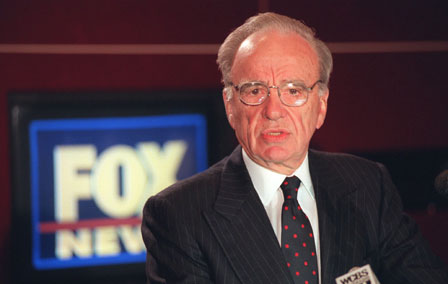Murdoch Follows His Gut, With More Surprises To Come

Congratulations to Rupert Murdocha nd to News Corp on the acquisition of Dow Jones & Company and its flagship brand, The Wall Street Journal. And thank you, Rupert.
One of my first jobs in New York (the one shortly after college that never makes it onto the resume) was working for his Star magazine, which was launched as a national tabloid soon after Murdoch made his first U.S. acquisitions, the San Antonio Express and the San Antonio News. Since my parents lived in San Antonio, I was especially aware of Murdoch's acquisitions and followed his rapid national expansion of the weekly Star insert, which became theNational Star and that he soon sold.
As Murdoch's News Corp. expanded, I continued to pay attention. When, in 1985, he was sworn in as a U.S. citizen after buying a small (6.7%) stake in Warner Communications and a 50% stake in20th Century Fox Film Corp, many pundits wrote of Rupert's Folly. Changing citizenship in order to circumvent FCC regulations restricting foreign ownership of broadcast licenses did not endear Murdoch to other media owners.
Nonetheless, he successfully acquired John Kluge's Metromedia, including its six television stations that became the foundation for the Fox TV Network, also considered a folly by competitors who believed the network marketplace would shrink from three to two. I attended a presentation by the then-president of NBC-TV, who forecast not only the failure of Fox, but the inevitable collapse of ABC within a decade. In the late 1980s and early 1990s, with $7 billion in debt hanging over the company, financial analysts considered his U.S. holding company to be a house of cards, propped up through intricate international financial models and highly leveraged assets.
Yet, by 1993, he was acquiring a majority stake in Asia's Star TV satellite operation, 49.9% ownership in India's Hindi Zee Channel, and, in 1994, he acquired 20% of New World's 12 major market TV stations from Ron Perelman, which included a deal to switch their affiliations to Fox. It was a move that forever upended the TV business and common perceptions of what's possible no matter how improbable.
Murdoch continued to challenge common perceptions. He turned around the NY Post, which he reacquired in 1993 after originally buying it in 1976 and selling it in1988; successfully launched Fox News around a controversial emphasis on conservatively slanted journalism; acquired majority interest in DirecTV; bought MySpace out from under Viacom for $580 million; and now half-bullied and half sweet-talked his way to the acquisition of Dow Jones.
In my new book,Virtual Worlds: Rewiring Your Emotional Future (www.jackmyers.com), I write "Corporations are brain-led and the larger corporations become, the more brain-led they are. Except for rare exceptions, like News Corp and its gut-led leader Rupert Murdoch, companies are required to operate almost exclusively on brain-led management. Most successful companies in any creative field like entertainment and fashion have been built on the gut instinct and heartfelt beliefs of their founders. As companies grow, they become increasingly dependent on intellectually-based programs and policies that guide brain-led management, while the more emotionally grounded founders lose influence and control. Few positions within the average corporation permit management decisions that defy the facts and intelligence and instead are based on gut instinct and feelings. Thus the demise of Ted Turner once he merged his company into Time Warner." Ironically, Murdoch's successful campaign to acquire Dow Jones is reminiscent of Turner's failed effort to acquire CBS, which rejected him because of who he was rather than the business opportunities he represented.
Murdoch's impressive success stems not only from his own excellent instincts, but because he empowers his management team to trust their gut feelings and their heartfelt beliefs, rather than demanding they justify their actions with facts and facts only.
This is the reality the editors and others at The Wall Street Journal missed in their opposition to the take-over. Those who can successfully make a strong case for editorial policies that will deliver audiences and relevance, will be empowered to manage independently. Those who expect Murdoch to follow an obvious course will inevitably be surprised. He will continue to upend industry expectations across all media. I expect his moves in the TV industry with the launch of Fox Businessand additional video properties behind it will be the most surprising.
Rupert Murdoch is more fascinating today than he was when he first came to these shores, when I was a writer for his Star magazine, doing celebrity interviews. Those of us who love this business and who treasure the few remaining legendary executives who can build and maintain control of their companies without losing touch with their emotional connections to it, should be very thankful for Rupert Murdoch. Do you agree?


